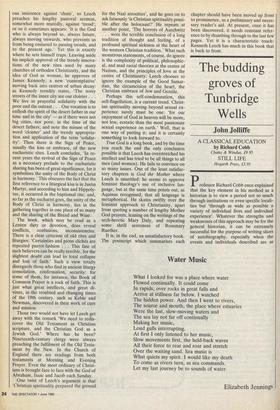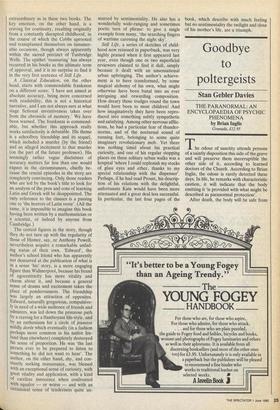The budding groves of Tunbridge Wells
John Jolliffe
A CLASSICAL EDUCATION by Richard Cobb
Chauo & Windus, £9.95
STILL LIFE
Hogarth Press, £3.95
Professor Richard Cobb once explained that the key element in his method as a historian is to view a period not so much through institutions or even specific locali- ties but 'through as wide as possible a variety of individual lives and individual experience'. Whatever the strengths and weaknesses of this approach may be for the general historian, it can be extremely successful for the purpose of writing slices of autobiography, especially when the events and individuals described are as extraordinary as in these two books. The key emotion, on the other hand, is a craving for continuity, resulting originally from a constantly disrupted childhood, in the course of which the Cobbs uprooted and transplanted themselves on innumer- able occasions, though always apparently within the sacred precinct of Tunbridge Wells. The epithet 'reassuring' has always recurred in his books as the ultimate term of approval, and it is no surprise to find it in the very first sentence of Still Life.
A Classical Education, on the other hand, starts with commendable frankness on a different score: 'I have not aimed at absolute accuracy, being more concerned with readability; this is not a historical narrative, and I am not always sure at what stage fictional inventiveness takes over from the chronicle of memory.' We have been warned. The frankness is commend- able, but whether this approach really works satisfactorily is debatable. His theme is a schoolboy friendship and its sequel, which included a murder (by the friend) and an alleged incitement to that murder (on the part of the future professor). His seemingly rather vague disclaimer of accuracy matters far less than one would expect in the circumstances, chiefly be- cause the crucial episodes in the story are completely convincing. Only those readers who are led by the book's title to look for an analysis of the pros and cons of learning Latin and Greek will be disappointed. The only reference to the classics is a passing one to 'the horrors of Latin verse'. (All the same, it is impossible to imagine this book having been written by a mathematician or a scientist, or indeed by anyone from Cambridge.) The central figures in the story, though they do not turn up with the regularity of those of Homer, say, or Anthony Powell, nevertheless acquire a remarkable unfad- ing status of their own. 'Edward', the author's school friend who has apparently not demurred at the publication of what is in a sense 'his' story, is a more engaging figure than Widmerpool, because his brand of egocentricity has more vitality and charm about it, and because a general sense of drama and excitement takes the place of ponderousness. The friendship was largely an attraction of opposites. Edward, naturally gregarious, compulsive- ly in need of a wide audience of friends and admirers, was led down the primrose path by a craving for a flamboyant life-style, and by an enthusiasm for a circle of jeunesse mildly doree which eventually (in a fashion perhaps more common in his native Ire- land than elsewhere) completely destroyed his sense of proportion. He was 'the last person ever to be prepared to listen to something he did not want to hear'. The author, on the other hand, shy, and con- stantly seeking reassurance, was blessed With an exceptional sense of curiosity, with great vitality and application, with a kind of carefree innocence when confronted with squalor — or worse — and with an occasional sense of tenderness quite un- marred by sentimentality. He also has a wonderfully wide-ranging and sometimes poetic turn of phrase: to give a single example from many, 'the searching fingers of wartime caressing the night sky'.
Still Life, a series of sketches of child- hood now reissued in paperback, was very highly praised when it first appeared last year, even though one or two superficial reviewers claimed to find it dull, simply because it dealt with an unsensational urban upbringing. The author's achieve- ment is to have transformed, by some magical alchemy of his own, what might otherwise have been banal into an ever intriguing and rewarding composition. How dreary those trudges round the town would have been to most children! And how imaginatively they have been repro- duced into something subtly sympathetic and satisfying. Among other nervous afflic- tions, he had a particular fear of thunder- storms, and of the nocturnal sound of running feet, belonging to some quite imaginary revolutionary mob. Yet there was nothing timid about his practical curiosity, and one of his regular stopping places on these solitary urban walks was a hospital 'where I could replenish my stocks of glass eyes and ether, thanks to my special relationship with the dispenser'. Perhaps, if he had read Proust, his descrip- tion of his relations with the delightful, unfortunate Kate would have been more attenuated and a great deal less successful. In particular, the last four pages of the book, which describe with much feeling but no sentimentality the twilight and close of his mother's life, are a triumph.



















































 Previous page
Previous page